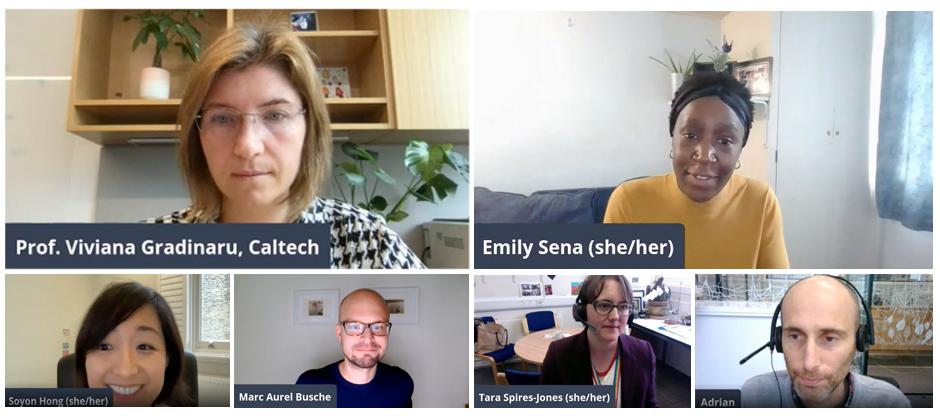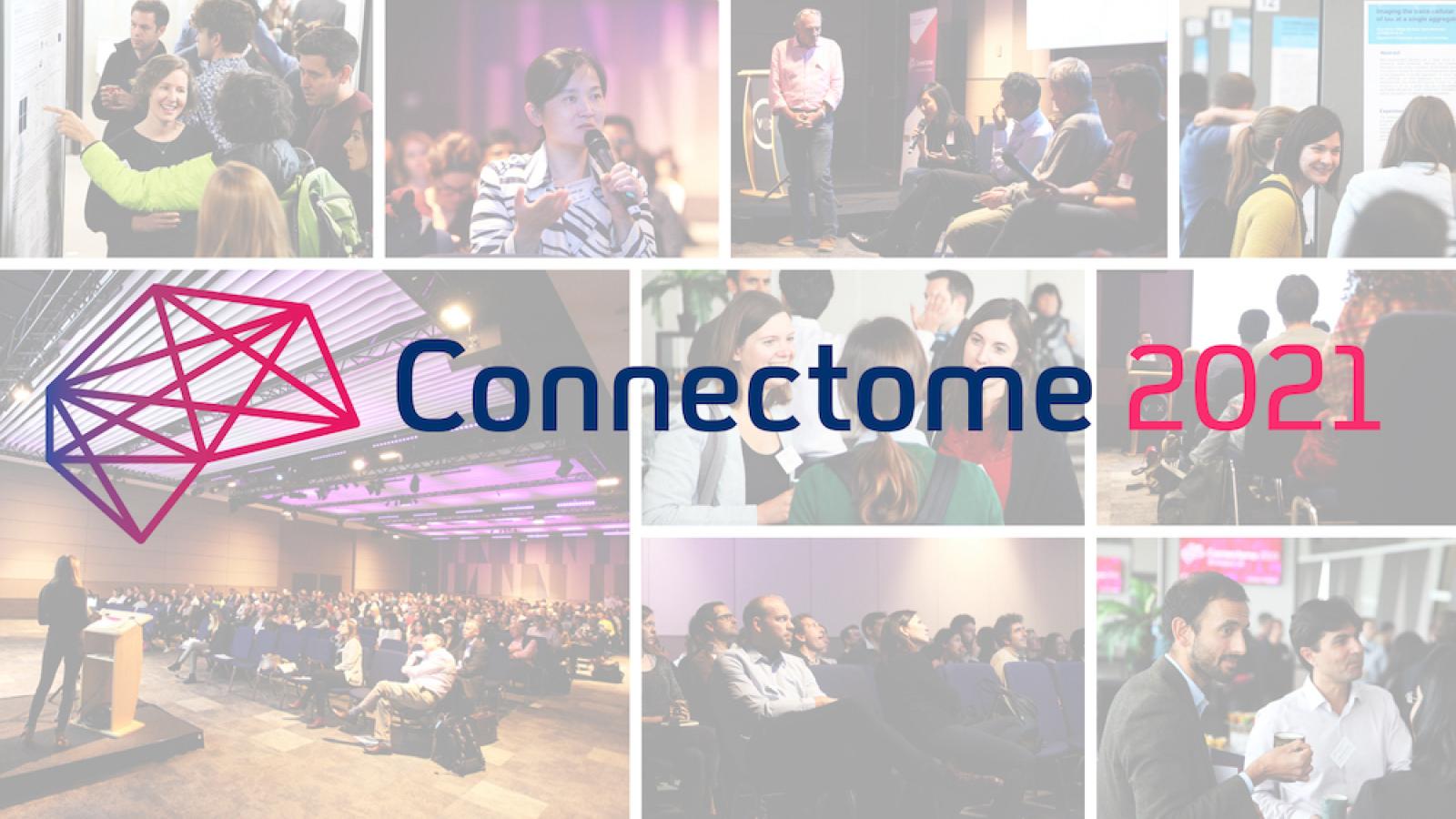Now in its fourth year, the annual internal conference from the UK DRI, Connectome, brought together the 650+ research community, providing a fantastic opportunity to catch up with faces, initiatives, and research at the Institute.
UK DRI Directors Prof Bart De Strooper and Dr Adrian Ivinson kicked off the 2-day main conference, updating on new UK DRI initiatives including the launch of the Emerging Leaders programme to support research fellows on their journey to independence, and further investment into new technologies – spatial transcriptomics, proteomics – and research infrastructure – IPSC Platform to Model Alzheimer’s Disease Risk (IPMAR).
The Directors also outlined their commitment to important research issues including open science and diversity. With expanding data science activities including an incoming Director of Data Science and Informatics, the Institute is working hard to promote transparent, reproducible practices that form the foundations of excellent research. Additionally, a dedicated think tank has been driving new activities around Equity, Diversity and Inclusion (EDI), with plans forming to position UK DRI as a leader in this area and tackle difficult challenges faced across all career stages.
virtual event including a dedicated ECR day
This year’s scientific programme was led by Group Leaders Dr Blanca Díaz-Castro (UK DRI at Edinburgh) and Dr Marc-David Ruepp (UK DRI at King’s). With the help of the committee, the pair focused on early career researchers (ECRs), Emerging Leaders and recently recruited Group Leaders. With the Edinburgh centre seeing the biggest expansion since Connectome 2020, the agenda had a particular focus on non-neuronal brain cells and their interactions in neurodegenerative disease. Other highlights and topics of interest included synapses, epigenetics, selective brain region vulnerability and advanced biosensing technology.
On the scientific programme, Dr Blanca Díaz-Castro and Dr Marc-David Ruepp, said:
“We aimed to represent the wide diversity of research areas at the UK DRI, featuring original and collaboratives studies, and importantly giving researchers at all stages of their career the opportunity to present. It was great to showcase new talent across the Institute and we were very pleased with the engagement from the audience. It felt like the speakers really benefited from the questions and the researchers took up the opportunity to chat face-to-face in the breakout rooms with the ECRs that presented.”
It was a pleasure to welcome excellent external keynotes lectures from Prof Vivianna Gradinaru (Caltech), a pioneer in the development of neuroscience tools and methods including the engineering of new viral vectors that can target specific brain cells, and Dr Emily Sena(University of Edinburgh), a passionate advocate for open science who outlined effective approaches for improving the validity, transparency and reproducibility of research output. After both keynotes, ECRs were invited to special Q&A sessions for this career level – a new feature of Connectome - to stimulate further discussion around the talk material and managing career progression.
On the keynote speakers, Dr Díaz-Castro and Dr Ruepp, added:
“We were extremely pleased with the keynote lectures as the work of both Prof Gradinaru and Dr Sena is greatly relevant to the scientific progress of dementia research. They stimulated a lively discussion and, in our opinions, portrayed outstanding role models for the younger researchers at the Institute.”
scientific speakers over the main conference

(left) Prof Viviana Gradinaru with chairs Dr Soyon Hong and Dr Marc-Aurel Busche (UK DRI at UCL)
(right) Dr Emily Sena with chairs Prof Tara
Following the success of the dedicated pre-connectome ECR day, an afternoon of engaging parallel sessions was again organised for this year’s event. Curated by the ECR representatives from each Centre, the agenda was bookended by a session on building collaborations with tips from current Group Leaders, and an outline of the best ways to communicate research to a wide variety of audiences led by the UK DRI HQ communications team.
There were three scientific discussions to choose from in the parallel sessions including models of neurodegeneration, the overlap between healthy ageing and dementia, and how to investigate the link between sleep disturbance and dementia risk. Separate sessions for Master’s/PhD, postdoc/fellows and technicians allowed for more focused insight and advice at these career stages.
afternoon ECR sessions
I actually attended the session for the level above me and loved it as I was able to get a lot of insight into the strategy, challenges and process of becoming an independent PI in the future.ECR survey respondent
The main goal of Connectome is to bring together UK DRI community to share research and ideas, and although this can be tricky in the virtual space, it was fantastic to experience so much engagement across the conference.
For many of the researchers who are primarily lab-based, it’s always a highlight to see the impact of our research on people living with dementia. On day one, the Connectome audience were treated to a powerful new film from the Care Research and Technology Centre centred on their work and how it’s making a difference for those people involved in the innovative Minder study.
The insight video format was refreshed this year with longer talks and parallel face-to-face discussion taking place afterwards in breakout rooms, which allowed for more interesting and in-depth follow up. The new virtual platform also included a participant matchmaking feature to stimulate collaboration based on research interests. Back by popular demand, ‘Pets of Connectome’ returned and many of the researchers generously posted baby pictures for a ‘Guess the Group Leader’ game.
We’d like to say a huge thanks to all the speakers, chairs and organisers at Connectome 2021. Recordings are now available on the SpotMe platform for UK DRI researchers, and will soon be additionally uploaded to the UK DRI Portal. We’re looking forward to welcoming everyone to an in-person Connectome 2022 in Brighton from 2-4 November!
Article published: 29 October 2021
